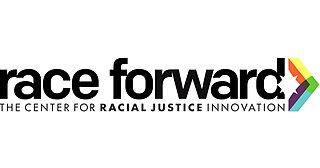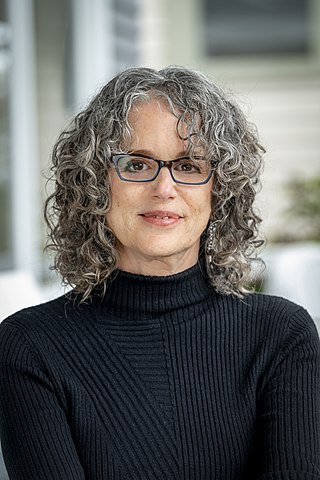Related Research Articles

Redlining is a discriminatory practice in which services are withheld from neighborhoods that have significant numbers of racial and ethnic minorities. Redlining has been most prominent in the United States of America, and has mostly been directed against African-Americans. While the best-known examples involve denial of credit and insurance, denial of healthcare and the development of food deserts in minority neighborhoods are also sometimes described as redlining.
Institutional racism, also known as systemic racism, is defined as policies and practices that exist throughout a whole society or organization that result in and support a continued unfair advantage to some people and unfair or harmful treatment of others based on race or ethnic group. It manifests as discrimination in areas such as criminal justice, employment, housing, healthcare, education and political representation.
The Tyree Scott Freedom School is an educational program in Seattle, Washington, with a curriculum on social justice issues and anti-racist community organizing in Seattle. The project also holds a monthly gathering of anti-racist educators, whose goal is to end institutional racism in the education system.

People's Action is a national progressive advocacy and political organization in the United States made up of 40 organizations in 30 states. The group's stated goal is to "build the power of poor and working people, in rural, suburban, and urban areas to win change through issue campaigns and elections."
A fenceline community or frontline community is a neighborhood that is immediately adjacent to a company, military base, industrial or service center and is directly affected by the noise, odors, chemical emissions, traffic, parking, or operations of the company. These communities are exposed to hazardous chemicals, high pollution levels, and environmental degradation along with the threat of chemical explosions.
Societal racism is a type of racism based on a set of institutional, historical, cultural and interpersonal practices within a society that places one or more social or ethnic groups in a better position to succeed and disadvantages other groups so that disparities develop between the groups. Societal racism has also been called structural racism, because, according to Carl E. James, society is structured in a way that excludes substantial numbers of people from minority backgrounds from taking part in social institutions. Societal racism is sometimes referred to as systemic racism as well.

Anti-racism encompasses a range of ideas and political actions which are meant to counter racial prejudice, systemic racism, and the oppression of specific racial groups. Anti-racism is usually structured around conscious efforts and deliberate actions which are intended to create equal opportunities for all people on both an individual and a systemic level. As a philosophy, it can be engaged in by the acknowledgment of personal privileges, confronting acts as well as systems of racial discrimination and/or working to change personal racial biases. Major contemporary anti-racism efforts include the Black Lives Matter (BLM) movement and workplace anti-racism.

Race Forward is a nonprofit racial justice organization with offices in Oakland, California, and New York City. Race Forward focuses on catalyzing movement-building for racial justice. In partnership with communities, organizations, and sectors, the organization build strategies to advance racial justice in policies, institutions, and culture.
Prejudice plus power, also known as R = P + P, is a stipulative definition of racism used in the United States, often by anti-racist activists. Patricia Bidol-Padva first proposed this definition in a 1970 book, where she defined racism as "prejudice plus institutional power." According to this definition, two elements are required in order for racism to exist: racial prejudice, and social power to codify and enforce this prejudice into an entire society. Adherents write that while all people can be racially prejudiced, minorities are powerless and therefore only white people have the power to be racist. This definition is supported by the argument that power is responsible for the process of racialization and that social power is distributed in a zero-sum game.

Ibram Xolani Kendi is an American author, professor, anti-racist activist, and historian of race and discriminatory policy in America. In July 2020, he founded the Center for Antiracist Research at Boston University where he serves as director. Kendi was included in Time's 100 Most Influential People of 2020. Kendi has attracted criticism for his alleged financial mismanagement of the Center for Antiracist Research.

Robin Jeanne DiAngelo is an American author working in the fields of critical discourse analysis and whiteness studies. She formerly served as a tenured professor of multicultural education at Westfield State University and is currently an affiliate associate professor of education at the University of Washington. She is known for her work pertaining to "white fragility", an expression she coined in 2011 and explored further in a 2018 book entitled White Fragility: Why It's So Hard for White People to Talk About Racism.
Joseph Barndt is an American Lutheran pastor and anti-racism activist. He is the co-founder of the Chicago-based racial justice advocacy group Crossroads Antiracism Organizing & Training, and formerly served as its executive director. The ministry offers anti-racist training sessions to religious and community groups. He has been a pastor at Lutheran churches in Chicago, New York City, and Arizona. He is known for advocating for white people to dismantle the institutions that perpetuate racial inequality in America, rather than directly helping minorities. In 2008, Matt Miller of the Chicago Reporter wrote that Barndt "has put forth what some consider some of the most revolutionary anti-racism work of the day."
Bonita Lawrence is a Canadian writer, scholar, and professor in the Department of Equity Studies at York University in Toronto, Canada. Her work focuses on issues related to Indigenous identity and governance, equity, and racism in Canada. She is also a traditional singer at political rallies, social events, and prisons in the Toronto and Kingston areas.
Julia Chinyere Oparah, formerly Julia Sudbury, is a faculty member at the University of San Francisco. She is also the founder of the Center for Liberated Leadership in Oakland, California. Oparah is an activist-scholar, a community organizer, and an intellectual focused on producing relevant scholarship in accompaniment to social justice movements. She has worked at University of California - Berkeley, University of Toronto and Mills College prior to the University of San Francisco.
Milton Arthur Galamison was a Presbyterian minister who served in Brooklyn, New York. As a community activist, he championed integration and education reform in the New York City public school system, and organized two school boycotts.
Collins O. Airhihenbuwa is a Beninese public health researcher. He is Director of the Global Research Against Non-communicable Disease (GRAND) Initiative and Professor of Health Management & Policy at Georgia State University.
María Reinat-Pumarejo is a Puerto Rican peace and anti-racism activist.
Chandra L. Ford is an American public health academic who is Professor of Community Health Sciences at the University of California, Los Angeles. She serves as Founding Director at the Center for the Study of Racism, Social Justice & Health. Her research considers relationships between racism and health outcomes.

Tawana Petty is an American author, poet, social justice organizer, mother and youth advocate who works to counter systemic racism. Petty formerly served as Director of Policy and Advocacy for the Algorithmic Justice League representing AJL in national and international processes shaping AI governance.
Ronald Chisom is an African American author, civil rights activist and a community organizer who was involved in fighting for justice and equality for marginalized communities in the United States. He was a co-founder of People's Institute for Survival and Beyond. and a medical researcher at Louisiana State University Medical School. Born in 1941 in New Orleans, Louisiana, Chisom grew up in a segregated society that was affected by racism and discrimination.
References
- ↑ PhD, E. J. R. David (December 9, 2013). Internalized Oppression: The Psychology of Marginalized Groups. Springer Publishing Company. ISBN 978-0-8261-9925-6.
- 1 2 3 "Deutsch Foundation Hosts Workshops with the People's Institute for Survival and Beyond". Robert W. Deutsch Foundation. Retrieved March 17, 2023.
- ↑ "Our Founders – PISAB" . Retrieved March 18, 2023.
- 1 2 Brown, Philip; Corrigan, Michael W.; Higgins-D'Alessandro, Ann (2012). Handbook of Prosocial Education. Rowman & Littlefield. ISBN 978-1-4422-1119-3.
- ↑ Green, Meghan (July 15, 2017). Racism in America: A Long History of Hate. Greenhaven Publishing LLC. ISBN 978-1-5345-6144-1.
- ↑ Committee, United States Social Forum Book (2010). The United States Social Forum: Perspectives of a Movement. Lulu. ISBN 978-0-557-32373-9.
- ↑ Brown, Philip M.; Corrigan, Michael W.; Higgins-D'Alessandro, Ann (October 12, 2012). Handbook of Prosocial Education. Rowman & Littlefield Publishers. ISBN 978-1-4422-1121-6.
- ↑ The Tuscaloosa News. The Tuscaloosa News.
- ↑ Bangor Daily News. Bangor Daily News.
- ↑ Kwiatkowski, Marisa. "Undoing Racism workshops tackle 'implicit biases'". The Indianapolis Star. Retrieved March 21, 2023.
- ↑ "UBW Stands In Solidarity With The Statement from PISAB". Urban Bush Women. Retrieved March 21, 2023.
- ↑ Chisom, Ronald (1997). Undoing Racism: A Philosophy of International Social Change. People's Institute Press. ISBN 978-0-9653305-1-0.
- ↑ "Opinion | The Race Conversation". The New York Times. November 22, 2014. ISSN 0362-4331 . Retrieved March 19, 2023.
- ↑ Haniff, Nesha Z. (November 24, 2022). The Pedagogy of Action: Small Axe Fall Big Tree. Springer Nature. ISBN 978-981-19-0801-9.
- ↑ "Undoing Racism Workshop". Welcome to Mary Pender Greene, LCSW-R, CGP President and CEO of MPG Consulting. Retrieved March 17, 2023.
- ↑ Riley, Ann T.; Bewley, Kirby; Butler-King, Renea L.; Byers, Lisa G.; Miller, Christina R.; Dell, Jennifer E.; Kendrick, Charlotte J. (September 23, 2021). "Finding Shelter in the Storm: Undoing Racism in a Predominantly White School of Social Work". Advances in Social Work. 21 (2/3): 898–919. doi: 10.18060/24117 . ISSN 2331-4125. S2CID 239195161.
- ↑ Milwaukee, Health Compass. "Health Compass Milwaukee :: Promising Practices :: Evaluating Undoing Racism and Health Equity Training with a State Health Department". www.healthcompassmilwaukee.org. Retrieved March 17, 2023.
- 1 2 Fitzgerald, Dylan (July 24, 2019). "Building the Field: Reflections on Undoing Racism". Living Cities. Retrieved March 17, 2023.
- ↑ "Partnering Organizations, Embodying Antiracism – Wesleyan University". www.wesleyan.edu. Retrieved March 18, 2023.
- ↑ "Undoing Racism Workgroup". ssw.umich.edu. Retrieved March 18, 2023.
- 1 2 Hamilton-Mason, Johnnie; Schneider, Samantha (April 3, 2018). "Antiracism Expanding Social Work Education: A Qualitative Analysis of the Undoing Racism Workshop Experience". Journal of Social Work Education. 54 (2): 337–348. doi:10.1080/10437797.2017.1404518. ISSN 1043-7797. S2CID 150193514.
- 1 2 Lykes, M. Brinton; Lloyd, Courtnye R.; Nicholson, Karla M. (December 2018). "Participatory and Action Research Within and Beyond the Academy: Contesting Racism through Decolonial Praxis and Teaching "Against the Grain"". American Journal of Community Psychology. 62 (3–4): 406–418. doi:10.1002/ajcp.12290. PMID 30479010. S2CID 53752326.
- 1 2 Yonas, Michael A.; Jones, Nora; Eng, Eugenia; Vines, Anissa I.; Aronson, Robert; Griffith, Derek M.; White, Brandolyn; DuBose, Melvin (December 8, 2006). "The Art and Science of Integrating Undoing Racism with CBPR: Challenges of Pursuing NIH Funding to Investigate Cancer Care and Racial Equity". Journal of Urban Health. 83 (6): 1004–1012. doi:10.1007/s11524-006-9114-x. ISSN 1099-3460. PMC 3261297 . PMID 17072760.
- ↑ Washburne, Sophie (July 15, 2020). Racism and Racial Justice. Cavendish Square Publishing, LLC. ISBN 978-1-5026-5752-7.
- ↑ "People's Institute for Survival and Beyond". InfluenceWatch. Retrieved March 21, 2023.
- ↑ "Undoing Racism: A Two-Day Workshop Hosted by OAR : Offender Aid and Restoration" . Retrieved March 17, 2023.
- ↑ "People's Institute for Survival and Beyond". InfluenceWatch. Retrieved March 17, 2023.
- ↑ "Workshops — The People's Institute for Survival and Beyond". Californians for the Arts. Retrieved March 17, 2023.
- ↑ "European Dissent Issues First National Statement". South Seattle Emerald. November 18, 2016. Retrieved March 17, 2023.